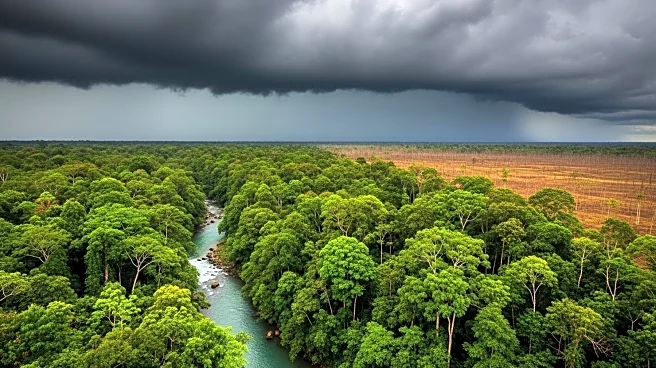What is the story about?
What's Happening?
Recent research has revealed that deforestation in Brazil's southern Amazon has led to a significant reduction in rainfall during the dry season, with a decrease of over 5% between 2002 and 2015. The study, conducted by researchers from Nanjing University and the University of Leeds, focused on the states of Rondônia and Mato Grosso, which have experienced substantial forest loss. This deforestation disrupts the atmospheric water cycle, reducing evapotranspiration and weakening atmospheric convection, which in turn diminishes rainfall. The consequences of reduced rainfall include compromised crops, increased wildfires, and water shortages, affecting local communities and ecosystems. The study highlights the sensitivity of Amazonian precipitation to changes in forest cover and warns of the broader impacts on agriculture and community life.
Why It's Important?
The findings underscore the critical role of the Amazon Rainforest in maintaining regional climate stability and the severe consequences of deforestation. Reduced rainfall can lead to agricultural losses, threatening Brazil's economy, which heavily relies on agriculture. The study suggests that continued deforestation could cost Brazil hundreds of billions in agricultural revenue by 2050. Additionally, the environmental impact extends to increased forest fires and water scarcity, which can isolate communities and disrupt daily life. The research calls for urgent action to curb deforestation and protect remaining forest areas to prevent further ecological and economic damage.
What's Next?
Researchers are conducting follow-up studies to assess the ongoing impact of deforestation on rainfall since 2015. The study advocates for policies that transition to greener energy and halt deforestation. It emphasizes the need for contingency plans for droughts and improved weather forecasts to help communities adapt. Protecting primary forests is prioritized over reforestation efforts, as recovery from deforestation is slow and incomplete. The study highlights the importance of involving farmers in conservation discussions, emphasizing the role of forests in sustaining agricultural productivity.
Beyond the Headlines
The study reveals deeper implications of deforestation, including its contribution to global climate change and the vulnerability of indigenous and marginalized communities. The loss of forest cover not only affects local climates but also contributes to global warming, exacerbating extreme weather events. The research highlights the ethical responsibility of addressing deforestation and its impact on human rights, as communities face increased health risks and economic challenges due to environmental degradation.














